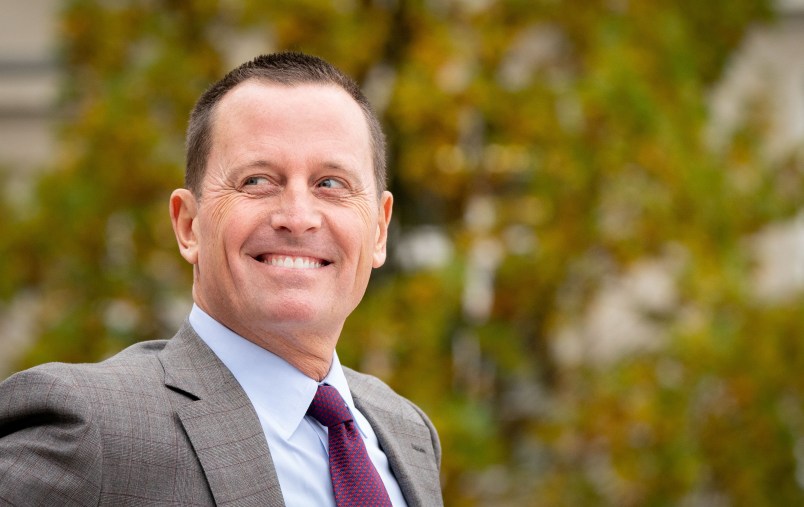Before acting Director of National Intelligence Richard Grenell entered government, he had a different career path: spin doctor, hired by a range of foreign clients.
Grenell embarked in 2016 on a public relations campaign against a Moldovan prosecutor who was cooperating with an investigation of large-scale money laundering. Grenell was reportedly working on behalf of a Moldovan political party and its oligarch leader.
The former prosecutor — Mihail Gofman — spoke with TPM on Monday in an exclusive interview.
“He came out of nowhere,” Gofman told TPM, referring to Grenell. “He was clearly hired to smear me.”
Craig Engle, an attorney for Grenell, declined to comment. A DOJ spokeswoman told TPM that the Justice Department generally neither confirms nor denies “the existence of any ongoing investigation.”
Gofman’s story — and how he came to be targeted by Grenell — is something out of a spy novel, with the longtime prosecutor fleeing Moldova in a borrowed car to share details about the allegedly corrupt dealings by the leadership of his country with the FBI.
In 2014, Gofman was a deputy chief in the country’s Office of Prevention and Control of Money Laundering. His unit began to uncover details of a massive bank fraud and money laundering operation involving the country’s leadership, he told TPM.
Millions of dollars from Moldova’s central bank, Gofman said, was siphoned into the United States. After being pushed out of the unit in 2014, purportedly for investigating the allegations, Gofman said that he tried to gain the attention of European officials, but failed.
By July 2016, Moldovans like Gofman were growing increasingly alarmed at high-level visits from the target of the longtime former prosecutor’s allegations: an oligarch named Vlad Plahotniuc, who ran the political party that reportedly hired Grenell.
Plahotniuc visited Washington in May 2016, scoring a visit with assistant secretary of state Victoria Nuland as he battled corruption allegations at home.
Plahotniuc’s nominally pro-West political party – the Democratic Party of Moldova – began to hire lobbyists in D.C. at around the same time.
Gofman recalled to TPM that he felt like he had run out of options in publicizing the corruption allegations. German diplomats he was in touch with had declined to open an investigation, but told Gofman that his activism had put him in danger and advised him to immediately leave the country. Gofman fled with his family in a borrowed car to neighboring Romania, before flying onwards to Washington, D.C.
The AP reported a similar account in 2016.
In the United States, he began to meet with U.S. officials, including the FBI and Homeland Security’s Global Illicit Financial Team. Gofman also began to get attention from the press, including a long piece in Forbes repeating his allegations.
“Around a month and a half after I arrived in Washington, Grenell and others started to attack me,” Gofman recalled to TPM.
Starting in August 2016, Grenell began to write a series of articles focusing on Moldovan politics.
The articles hit out at Gofman, describing him as “a former Moldovan official with ties to Russia … disguised as a whistleblower circulat[ing] the halls of official Washington.”
While the articles don’t elaborate on Gofman’s ties to Russia (which he denies), they do attempt to damage the prosecutor’s credibility, accusing him of presenting misleading information and being involved in the underlying crimes about which he was providing evidence.
“Grenell was saying that I was sent from Moscow,” Gofman said. “It was absurd.”
Gofman told TPM that the evidence he gave to the U.S. government eventually made its way to a trial attorney in the Money Laundering and Asset Recovery section of the Justice Department’s Criminal Division. The prosecutor whose name Gofman provided did not return a request for comment. No charges have been brought in the case.
The AP and Wall Street Journal both reported on Gofman’s claims in 2016, as did RFE/RL, a U.S.-government funded media outlet that covers the former Soviet Union. The accounts all line up, and emphasize Gofman’s role in supplying information to U.S. federal investigators.
“Unfortunately, the Internet has made it easy and relatively cheap to peddle rumors,” Grenell wrote in one of the columns. “Intelligence and counter intelligence is a “Great Game,” as Rudyard Kipling called it, that ‘never ceases, day or night.’ Sadly, it usually works overtime right before an important election.”
But Grenell didn’t just stumble upon Moldova, or wake up with an altruistic concern for Russian meddling in Moldovan politics. Rather, Grenell, ProPublica reported on Friday, was being paid by Plahotniuc, the Moldovan oligarch and target of Gofman’s allegations.
Grenell was reportedly hired through his company, Capitol Media Partners. The longtime Republican political consultant Arthur Finkelstein, now deceased, reportedly hired Grenell as a media consultant for the Moldova work. A financial disclosure shows that Grenell received more than $5,000 from Finkelstein as a client of his.
Neither Finkelstein nor Grenell registered as foreign agents under the Foreign Agents Registration Act.
The State Department banned Plahotniuc in January 2020, from entering the country. In a statement, Secretary of State Mike Pompeo cited Plahotniuc’s “corrupt actions,” and designated him under an area of law that allows the government to render foreign government officials ineligible for visas due to “their involvement, directly or indirectly, in significant corruption.”
It’s not clear if the designation occurred because of Gofman’s allegations.
David H. Laufman, a former chief of the Justice Department’s counterintelligence section, told TPM that Grenell’s conduct would likely raise issues under FARA and for any security clearance investigation.
“If [Grenell] was personally engaged in a public relations effort or media campaign in the United States on behalf of a foreign political party, I’d be surprised if the Justice Department did not find that to be registrable conduct under FARA,” Laufman said.
For Gofman, Grenell’s elevation to lead the U.S. intelligence community came as a shock.
“I think that if he had known how this would end, he wouldn’t have done it,” Gofman added.






